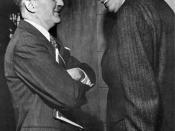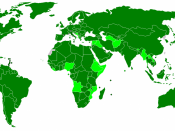The raging debate regarding the supposed failings of the International Monetary Fund, or IMF, is one that is so deep-rooted and filled with differing agendas that it would be impossible to do it justice in just 1000 words. My objective is to cover the main issues of the debate and form my own opinions from various sources and viewpoints of the situation through the medium of this essay.
To begin, the IMF was established, in its own words (IMF, 2002), to "prevent crises in the system... through monitoring, lending and giving technical assistance... to any of its 184 member countries". In this sense, it is unique, acting as the central institution of the international monetary system and enabling trade between its members. It was set up by treaty in 1945, creating a specialised agency of the United Nations, and provides a fund which can be tapped by the members when they need and on certain conditions, often that the country must adopt supposedly sound economic policies set out by the IMF itself.
There are a few grey areas surrounding the structure of the IMF and what its principles are, I will deal with these before the more in-depth and specific issues. Global Exchange (GE, 2001) labelled the IMF "undemocratic" due firstly to its structure whereby the richer countries seem to have more voting power as they invest heavily into the fund itself. This is unfair on continents such as Africa who receive a high proportion of help, but don't get much input or voting right. However, just like a shareholder in a business, the more you invest, the more control you demand, and it is also often viewed that these countries i.e. UK, USA have better decision-making skills than their less wealthy counterparts, although this is called into question.


![International Monetary Fund [oct 25]](https://s.writework.com/uploads/3/37331/international-monetary-fund-oct-25-thumb.jpg)